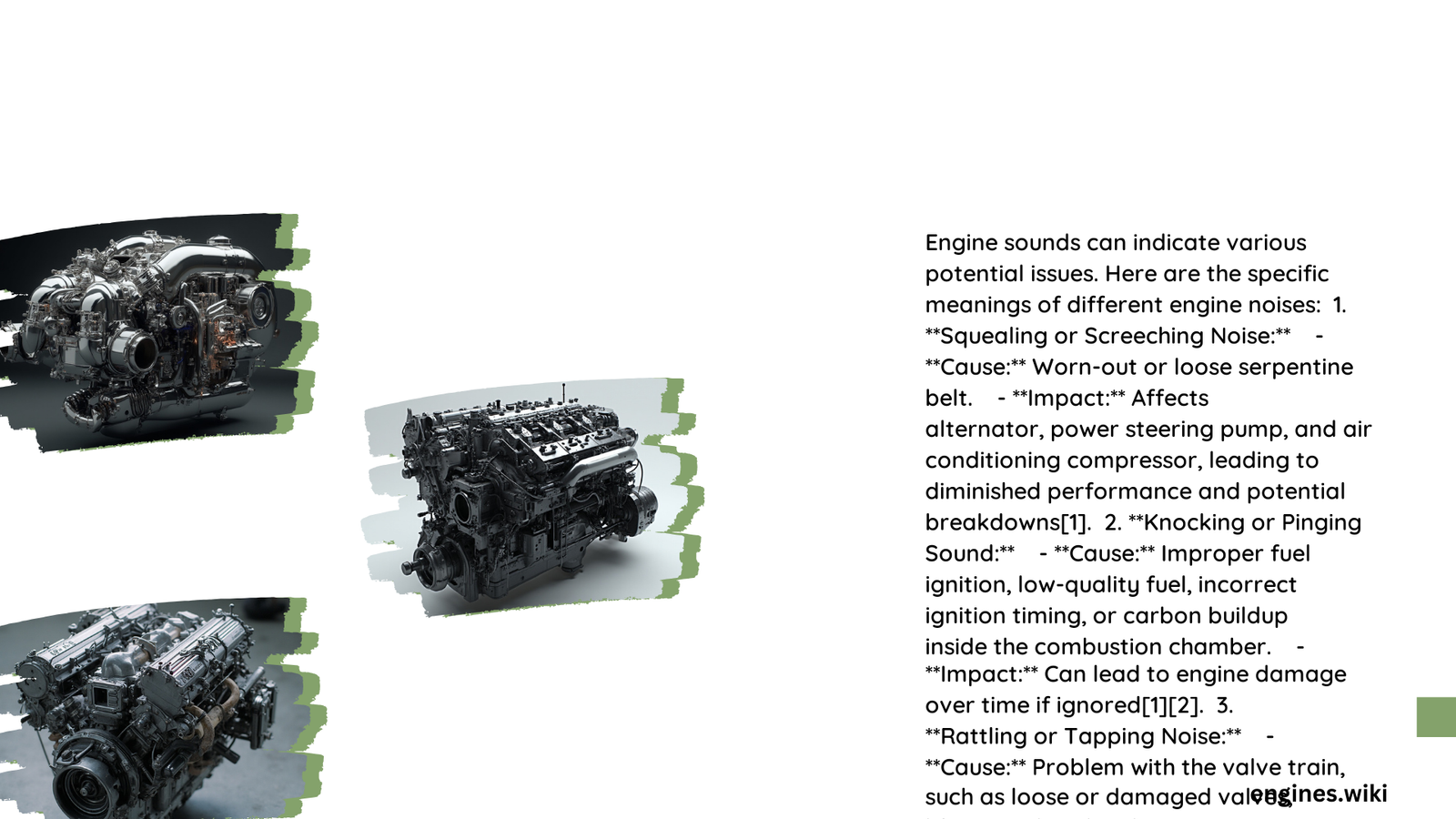Engine sounds can be indicative of various issues in your vehicle. Understanding what different engine sounds mean is crucial for maintaining your car’s health and preventing costly repairs. This guide explores common engine noises, their potential causes, and the implications for your vehicle’s performance. From knocking sounds to high-pitched whines, we’ll decode these auditory signals to help you better understand your car’s needs.
What Does an Engine Knocking Sound Indicate?
An engine knocking sound, often described as a metallic pinging or tapping, is a serious issue that requires immediate attention. This sound can indicate several problems:
- Low engine oil
- Crankshaft or rod knock
- Pre-ignition or detonation knock
- Valvetrain trouble
- Bad knock sensor
Potential Causes of Engine Knocking
| Cause | Description | Severity |
|---|---|---|
| Low Engine Oil | Inadequate lubrication leading to metal-to-metal contact | High |
| Crankshaft/Rod Knock | Increased clearance between connecting rods and crankshaft | Very High |
| Pre-Ignition/Detonation Knock | Fuel-air mixture igniting too early | Moderate to High |
| Valvetrain Trouble | Issues with valve components or clearances | Moderate |
| Bad Knock Sensor | Incorrect adjustments in engine timing or fuel/air ratio | Moderate |
How Severe is Engine Knocking?
The severity of engine knocking can range from minor to catastrophic:
- Minor cases may resolve with simple fixes like oil refills or fuel changes
- Severe cases can indicate significant internal engine damage
- Continued driving with engine knock can lead to catastrophic engine failure
What Actions Should Be Taken for Engine Knocking?
- Immediate inspection by a professional technician
- Stop driving the vehicle to prevent further damage
- Address underlying issues based on diagnosis (e.g., oil change, component replacement)
What Causes High-Pitched Engine Noises?

High-pitched engine noises can stem from various mechanical issues:
- Loose or worn belts
- Faulty timing chain
- Bad belt tensioners
When Are High-Pitched Noises Most Noticeable?
These noises are often more pronounced:
- At higher RPMs
- During acceleration
- In vehicles with timing chains and multiple belt-driven accessories
What Are the Implications of High-Pitched Engine Noises?
Ignoring these noises can lead to:
- Belt failure
- Engine overheating
- Lack of power
- Engine misfires
- Potential engine damage due to timing issues
What Does an Engine Backfire Sound Indicate?
An engine backfire is a loud, sharp noise occurring when fuel-air mixture ignites outside the combustion chamber.
What Causes Engine Backfires?
- Timing issues
- Fuel mixture problems
- Ignition system problems
How Does Backfiring Affect Engine Performance?
Backfires can lead to:
- Decreased engine performance
- Reduced fuel efficiency
- Potential damage to the exhaust system and catalytic converter
What Does a Low Rumbling Engine Noise Signify?
A low rumbling engine noise can indicate several underlying issues, particularly noticeable during idling or low-speed driving.
What Are the Possible Sources of Low Rumbling Noises?
- Low oil level
- Worn crankshaft bearings
- Excessive crankshaft end-play
How to Diagnose Low Rumbling Engine Noises?
Follow these steps for diagnosis:
- Check oil level and viscosity
- Inspect bearings for wear or failure (professional inspection recommended)
- Evaluate crankshaft end-play
What Are the Key Takeaways About Engine Sounds?
Understanding what different engine sounds mean is crucial for vehicle maintenance:
- Knocking sounds often indicate serious issues requiring immediate attention
- High-pitched noises may signal belt or timing chain problems
- Backfires can be symptoms of timing or fuel mixture issues
- Low rumbling noises might be related to oil levels or bearing wear
Regular maintenance and prompt attention to unusual sounds can prevent minor issues from becoming major problems, ensuring the longevity and performance of your vehicle’s engine.
